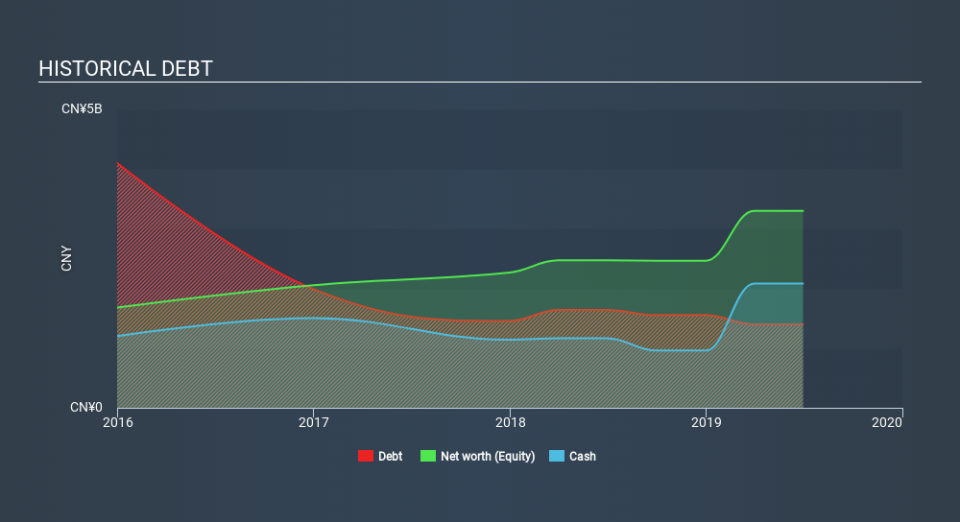Is Chengdu Expressway (HKG:1785) A Risky Investment?

David Iben put it well when he said, 'Volatility is not a risk we care about. What we care about is avoiding the permanent loss of capital. So it seems the smart money knows that debt - which is usually involved in bankruptcies - is a very important factor, when you assess how risky a company is. We can see that Chengdu Expressway Co., Ltd. (HKG:1785) does use debt in its business. But is this debt a concern to shareholders?
When Is Debt A Problem?
Debt assists a business until the business has trouble paying it off, either with new capital or with free cash flow. In the worst case scenario, a company can go bankrupt if it cannot pay its creditors. However, a more usual (but still expensive) situation is where a company must dilute shareholders at a cheap share price simply to get debt under control. By replacing dilution, though, debt can be an extremely good tool for businesses that need capital to invest in growth at high rates of return. The first thing to do when considering how much debt a business uses is to look at its cash and debt together.
See our latest analysis for Chengdu Expressway
What Is Chengdu Expressway's Debt?
You can click the graphic below for the historical numbers, but it shows that as of June 2019 Chengdu Expressway had CN¥1.40b of debt, an increase on CN¥1.6k, over one year. However, its balance sheet shows it holds CN¥2.08b in cash, so it actually has CN¥684.5m net cash.
How Strong Is Chengdu Expressway's Balance Sheet?
According to the last reported balance sheet, Chengdu Expressway had liabilities of CN¥1.43b due within 12 months, and liabilities of CN¥1.29b due beyond 12 months. Offsetting this, it had CN¥2.08b in cash and CN¥256.0m in receivables that were due within 12 months. So its liabilities outweigh the sum of its cash and (near-term) receivables by CN¥385.6m.
Given Chengdu Expressway has a market capitalization of CN¥3.16b, it's hard to believe these liabilities pose much threat. Having said that, it's clear that we should continue to monitor its balance sheet, lest it change for the worse. Despite its noteworthy liabilities, Chengdu Expressway boasts net cash, so it's fair to say it does not have a heavy debt load!
Another good sign is that Chengdu Expressway has been able to increase its EBIT by 24% in twelve months, making it easier to pay down debt. The balance sheet is clearly the area to focus on when you are analysing debt. But you can't view debt in total isolation; since Chengdu Expressway will need earnings to service that debt. So when considering debt, it's definitely worth looking at the earnings trend. Click here for an interactive snapshot.
Finally, a business needs free cash flow to pay off debt; accounting profits just don't cut it. While Chengdu Expressway has net cash on its balance sheet, it's still worth taking a look at its ability to convert earnings before interest and tax (EBIT) to free cash flow, to help us understand how quickly it is building (or eroding) that cash balance. During the last three years, Chengdu Expressway produced sturdy free cash flow equating to 76% of its EBIT, about what we'd expect. This free cash flow puts the company in a good position to pay down debt, when appropriate.
Summing up
While Chengdu Expressway does have more liabilities than liquid assets, it also has net cash of CN¥684.5m. The cherry on top was that in converted 76% of that EBIT to free cash flow, bringing in CN¥607m. So is Chengdu Expressway's debt a risk? It doesn't seem so to us. The balance sheet is clearly the area to focus on when you are analysing debt. However, not all investment risk resides within the balance sheet - far from it. For example, we've discovered 3 warning signs for Chengdu Expressway that you should be aware of before investing here.
When all is said and done, sometimes its easier to focus on companies that don't even need debt. Readers can access a list of growth stocks with zero net debt 100% free, right now.
If you spot an error that warrants correction, please contact the editor at editorial-team@simplywallst.com. This article by Simply Wall St is general in nature. It does not constitute a recommendation to buy or sell any stock, and does not take account of your objectives, or your financial situation. Simply Wall St has no position in the stocks mentioned.
We aim to bring you long-term focused research analysis driven by fundamental data. Note that our analysis may not factor in the latest price-sensitive company announcements or qualitative material. Thank you for reading.


